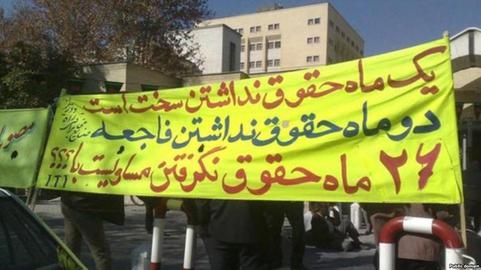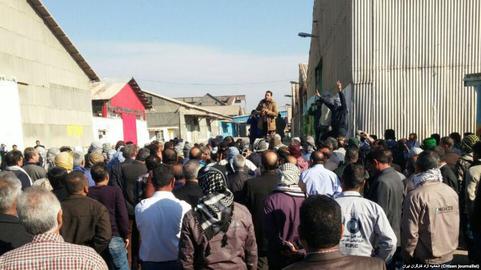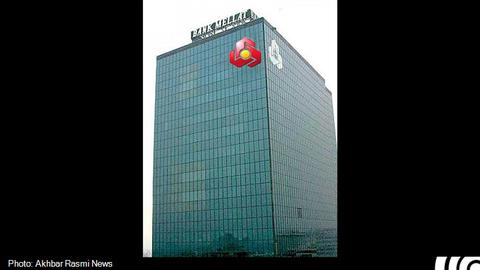Every week, somewhere in Iran, there’s a workers’ strike. People from different sectors and industries voice their grievances — usually about pay, or lack of it.
Protests like this hit the headlines in late December and early January, when people all over the country went out in the streets demanding change — workers demanding pay and adequate pensions, but also people from other walks of life demanding equality, a better standard of living and transparency in government. But these protests are nothing new; they have become a regular occurrence in many cities and towns across the country for many months.
When it comes to the employees who take to the streets on a regular basis, they come from many different sectors and industries. They are miners, government or municipality employees or retired teachers, and they all have one shared concern: They want to be paid. Many have gone for long periods without wages; their paychecks are either late or fall short of what was promised. They call out for what they are entitled to, but also, they demand to know why, in an economy rich with natural resources, neither the authorities nor their employers can guarantee regular payment arrangements.
The majority of the protesters work either for government-run companies or for conglomerates closely affiliated with the political establishment. At the same time, an increasing number of private businesses cannot pay their staff either.
Ali, a 35-year-old engineer employed by a workshop southwest of the capital Tehran, spoke to IranWire about his situation. He has not been paid for three months. “I have not had a regular paycheck for five years now; my employer pays when he has money”. When he doesn’t have the money to pay, Ali and his wife borrow from their parents, use their savings and scrape by until the next paycheck comes along. Even so, Ali considers himself to be fortunate. “I have a job and an employer who pays my salary, even though it’s late,” he says.
Ali does not blame his employer for delays in his pay. He knows that sales are extremely volatile. Sometimes his employers find it impossible to find a buyer for their products. And then when they do find buyers, sometimes they don’t actually pay, or their checks bounce and they are nowhere to be found. Some buyers use delay tactics to avoid paying in full or to they force Ali’s employer into settling for a portion of what is owed. Resorting to Iran’s legal system is of no use, as judges and the judiciary fail to take action in these cases.
Ali may forgive the private entrepreneur for late payment, but workers for conglomerates like the Iran National Steel Industrial Group (INSIG) or Haft Tappeh Sugarcane Agroindustry Company cannot forgive their employers, or their political affiliations. INSIG employs 4,000 workers, and they have not been paid for more than four months. When workers came out on the streets of Ahwaz, the capital of oil-rich Khuzestan province, to protest, authorities arrested them instead of listening to their grievances. In December, workers at Haft Tappeh went on strike to demand five months' worth of back pay. After a five-day strike, the management promised the workers they would be paid— a promise that was reiterated by the provincial authorities. No one said the workers were wrong to make their claims, and all seemed to be rallying to their assistance. Believing the promises, Haft Tapeh employees returned to work. However, this was yet another unfulfilled promise.
It took the suicide of one worker, Ali Naghadi, for the management to follow through on its promise — and then it only did so partially. Instead of receiving five months of back pay, Haft Tappeh workers received their December pay in February.
And then, two weeks before the Iranian New Year celebrations, the Haft Tappeh Sugarcane Agroindustry Company’s Public Relations Office announced that the factory was shutting down. One employee from the Haft Tappeh accounting department revealed on Twitter that the factory closure was a tactic to avoid paying them — if there was no work to carry out, then workers could not demand to be paid. However, it seemed that only the laborers were told to go home; those in management and administration roles remained at the company and kept their jobs.
Omid, a 50-year-old business analyst who lives in Ahwaz, talked to IranWire. Omid has been following the events at Haft Tappeh closely, and assessing why these conglomerates fail to pay their staff. “The management teams at such organizations are not competent. Their priorities are not business-oriented,” he says. And in most cases, the management owes its position to the political establishment, not to its productivity or its market performance. In fact, INSIG, Haft Tappeh and similar entities have had several management teams at the helm, all of which have added to the businesses’ accumulated losses — making the companies more dependent on government subsidies and funding.
Currently, Omid Asabeigi is Haft Tappeh's CEO. Barely into his thirties, Asabeigi purchased Haft Tappeh two years ago for less than US$2 million. He claims to be a private entrepreneur, but many people regard him as the front man for a special interest group. It is rumored that his family-owned holding company manages several businesses across Iran. Asadbeigi seems more concerned with public relations, maintaining his political connections and keeping contacts happy than he is in making sure his workers are treated well. As workers began their strike to demand their back-pay, Asadbeigi was pouring funds into the sponsorship of Khuzestan Isteghlal Football Club. On the eve of the Iranian New Year — a time when Iranian families particularly need money — Shakila Monfared, an employee of Haft Tappeh’s accounting department, posted the following comment on Twitter: “All departments are paid their salaries, New Year bonus and other benefits in full except for workers at Haft Tappeh”.
But Haft Tappeh is just one example of many, in which employees in similar companies and semi-public businesses have gone without pay for long periods. While analysts argue the phenomenon is due to lack of sales, insufficient production or financial challenges, it is notable that the people in charge of these organizations neither seek new markets nor prioritize boosting the generation of revenue. And for the most part, these businesses have no reporting procedures in place, and no proper financial analysis. Where there are some procedures in place, says Omid, the analyst I spoke to, they are not reliable. “It is impossible to trust accounting reports, when we know accounting standards and best practices are not followed,” he says. Companies face mounting challenges in an unpredictable economy where banks are not part of the global network. The fact that their managers do not want to take on these challenges demonstrates there is no solution in place to deal with the economic environment, or with any volatilities that may affect it.
Of course, it is not the management, board members or the white-collar workforce who pay for economic instability or deteriorating sales. The workers do. When they speak up, they are confronted by police and the security forces. Promises coming from high up in the company cannot be trusted. Workers know they rank very low on the management’s list of priorities. Yet at the same time, they ask: If the goal is not to produce goods, then why will no one admit it? More and more, Iranian workers come to the conclusion that they and their families must pay for the mistakes of others, and for the rampant cronyism in Iran. As their anger, despondency and determination builds, their protests will continue. The question is: when will Iranian employers — and, crucially, Iranian politicians and leaders — start listening?
visit the accountability section
In this section of Iran Wire, you can contact the officials and launch your campaign for various problems


























comments